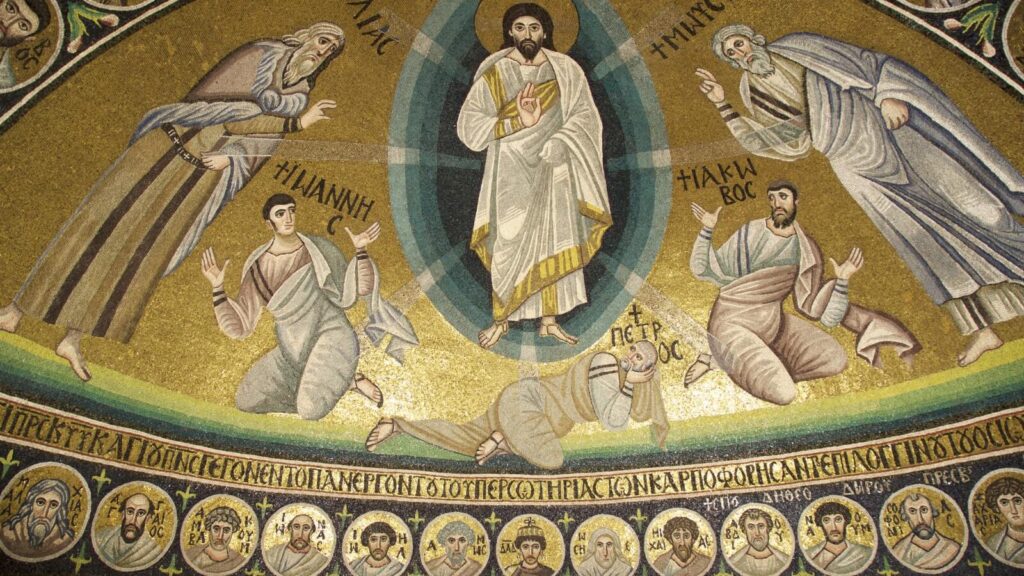+ ‘Glory’.
It’s funny how some words stand out. Today, transferred from yesterday, we celebrate the Transfiguration of Jesus on the mountain when Peter James and John see him as he really is, in the light of God, talking with Moses and Elijah. We’ve just heard Luke tell the story. Before that we had Peter in his Letter telling us he was there, like a Facebook post. Both Peter and Luke describe what happened using the word ‘glory’: Jesus ‘received honour and glory’; ‘they saw his glory’. All Christianity can be encompassed under this word ‘glory’. But are we just like the revivalist preacher who shouts ‘glory, alleluia’ – and makes no difference to our lives. What does ‘glory’ mean?

Go back to the mountain top. The disciples ‘saw his glory’; they heard God the Father speaking to Jesus; the cloud overshadowed them. They saw, heard and felt the glory. It is just like the experience of Moses and Aaron in today’s psalm on the ‘holy hill’ of Mount Sinai where the Father spoke, a psalm where the word ‘holy’ takes the place of ‘glory’. In the Bible we are expected to see the connections – God speaking in a cloud on a mountain.
On the Mount of the Transfiguration we have something new. Not the words of the Ten Commandments but – Jesus; the voice; and the cloud: three in one glory. Traditionally this is seen as God revealed as Holy Trinity, with the cloud as the Spirit. Sermons often start with an invocation of the Holy Trinity but today we don’t need to. The one word ‘glory’ is the whole Trinity. But now I want to look at the disciples. ‘They saw his glory’. They looked away from themselves to God. They didn’t indulge in some psychotherapy, however useful that may be at times. They didn’t look at themselves. They looked at Jesus and saw the glory of God.
Here is a message for us. If we want to live authentic human lives we need to see the glory. Like the disciples, like Moses. We need to pray, to meditate – which doesn’t mean navel-gazing but looking at God; at God’s glory. Not thinking about the world and its problems but sitting quietly in a corner resting in God –meditation is as simple as that. Our Christian practice at church and elsewhere should teach us to de-centre ourselves. If we lose the practice of regular prayer and church attendance we easily slip into selfishness. The challenge is to turn from self to God: to God alone but also to God in our neighbour. That is what Christianity is about: Love God, love your neighbour; seek first the Kingdom of God and then all these other things will be added. Look at the Lord’s Prayer – Jesus tells us to look to our Father, God’s name, God’s Kingdom before we get down to bread and sin.
But what has sin to do with glory? Seventy-seven years ago on the feast of the Transfiguration the world saw a new bright cloud over the Japanese city of Hiroshima. The first nuclear attack. An anti-glory. Today the earth still faces a threat from nuclear armed rogue states like Russia and an additional devastation caused by climate change. What has this to do with Jesus’ glory on the mountain. Look again at the story. Moses and Elijah speak with Jesus about his ‘departure’ at Jerusalem. ‘Departure’, a bland word more fitted to Waverley Station, translates the Greek word ‘Exodus’. Jesus’ ‘exodus’ is his cross and resurrection; through the dark waters of torture, sin and death into the promised land of glory. But the Christian gift to the world is that the pain of the cross is itself, in a strange sense, ‘glory’. Like the disciples we sometimes glimpse the glory, but like them we all have to descend the mountain to the cross. And the cross is political, a challenge to the powers of evil in the world, so like the disciples we go out from the cross, from the Eucharist which re-presents Jesus’ sacrifice on the cross, into the world to change it.
One of the three disciples who ‘saw his glory’ was Peter. There’s a little phrase in our short reading from Peter, so small you may have missed it. He says of the glory, ‘be attentive to this as to a lamp shining in a dark place’. In the dark places of the world, in the darkness of your hearts guard the glimpses of glory. We find ourselves in darkness – of boredom; of betrayal, of illness, failing powers, bereavement, depression. In this it is only the glimpses of glory that can keep us going. This is the month of the Edinburgh Festivals. Many of us will be going to events and concerts and we have a tremendous cultural life in our city which suggests that glory is not only religious. If you go to an event in the Usher Hall you will see over the arch at the front the arms of Edinburgh with the motto Nisi Dominus frustra – ‘without the Lord it’s useless’. On one level that’s not true – non-Christians can see the glory in music and nature. But at a deeper level we Christians have the key. The key is Jesus: in the poverty of his birth; in his glory on the mountain; in the pain of his cross and the exodus of his resurrection – in these we don’t have answers but rather a way of living in the dark between the glimpses of glory. It’s worth coming here to this holy place if this is what we get, if it helps us see that, to quote Hopkins, despite the pain,
The world is charged with the grandeur of God.
It will flame out, like shining from shook foil.

